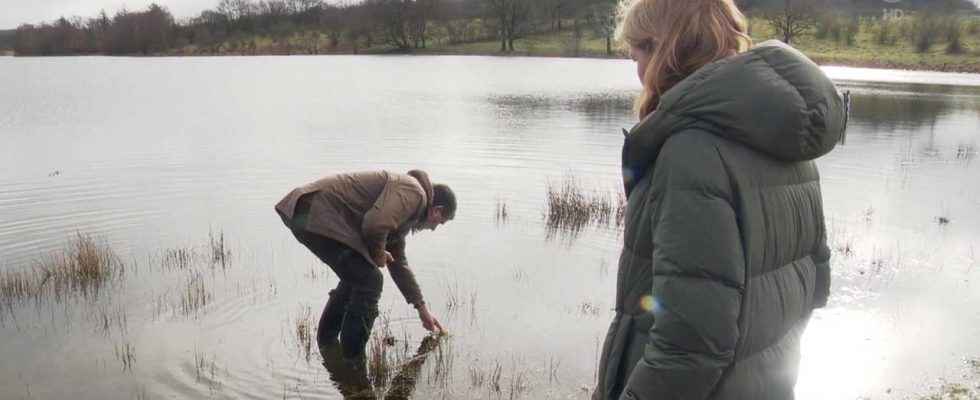In the middle
A construction waste dump is to be built in the middle of nature and landscape protection areas and a popular tourist region. There is protest against this in Eckernförde and the neighboring communities.
The closer you get to Eckernförde, the more wooden crosses appear in the front gardens and on the street. Inscription: “Stop landfill”. Emotions have been agitated since it became known that the private operator of a gravel pit is planning a landfill for construction waste.
The residents of the communities of Kosel and Gammelby, in whose area the landfill is to be built, are concerned. “Actually, everything is recycled today and what’s left isn’t just sand, but usually also has toxic side effects. And we have beautiful waters here where we swim and splash around. I don’t want it all to be ruined,” says a woman from Kosel at an information event in Eckernförde.
Eckhard Voss from the Eckernförde business group fears that the city could soon acquire what he considers an unsightly attribute: “We need people who want to work here and start a family and intact nature. We don’t want to be the landfill town of Eckernförde.”
More than three thousand people turned to the state parliament’s petitions committee in December to stop the project.
Gravel pit should become landfill
The case is complex: The operator of the gravel pit wants to convert it into a landfill for building rubble. Opponents fear damage to the tourism region’s image, noise and dirt caused by truck transport. Their biggest concern, however, is that pollutants could get into the groundwater.
The problem: The landfill would be located in the middle of nature and landscape protection areas, in the middle of sensitive nature. The adjacent Bültsee is part of a chain of lakes between Eckernförde and the Schlei, an arm of the Baltic Sea; and all are connected by groundwater.
Bültsee alone is one of only three lakes with a large number of extremely rare plant species: the strandling and the alternating-flowered milfoil are on Red List 1 in Schleswig-Holstein.
Conservationists such as biologist Gerd Kämmer hope that the rare species will also settle in the renatured gravel pit. “That would be a unique opportunity for nature conservation,” he says.
In such an environment, storing construction rubble just two meters above the groundwater is extremely unfavorable – also because thousands of households would be affected in the event of a leak, according to Kosel community representative Christiane Knabe. The Green politician is a member of the municipal landfill working group.
“We will meet all legal requirements”
The operator of the gravel pit, the Glindemann Group, points out that contaminated water from a landfill has never seeped into the groundwater in Schleswig-Holstein. “We will meet all legal requirements,” says the group’s spokesman during an on-site visit to the gravel pit.
He has not yet submitted an application for the planning approval process. According to his own statements, he is still waiting for the result of the “landfill needs study”. The state commissioned this to determine the need for landfills in Schleswig-Holstein. The landfill opponents doubt this.
Study result expected in spring
Schleswig-Holstein’s Environment Minister Tobias Goldschmidt assumes that there is a need. “That’s sad because we want to be a circular economy. But we’re not,” said the Green politician. “We build, we tear down. This creates waste. It has to go somewhere.”
Whether the location of a landfill near Kosel is even an option is the subject of an approval process, he says. “In fact, the location in Kosel is not ideal because of the many environmental concerns and needs to be examined.” The results of the study should be available in the spring.
Nothing has been decided yet
The crux of the matter is the location search. According to the current legal situation, only areas that the waste disposal company itself recommends can be considered. In this case, the only alternative would have been an area near Langwedel, which is also considered biologically sensitive.
Christiane Knabe sees the main problem as the fact that landfill planning is started based on the economic interests of an individual and may cause harm to all of us.
Even if nothing has been decided yet, protests against the plans for a construction waste dump are growing. Whether at information events, through posters, resolutions or even wooden crosses in their own front garden: the people in the region clearly show their unwillingness.

